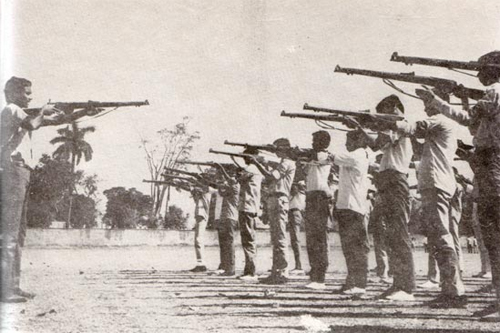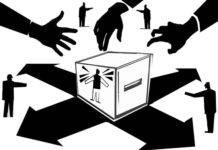Syed Badrul Ahsan
Too many people at home and abroad have been taking Bangladesh for granted for too long. The men in the leadership of an Awami League-allied outfit calling itself the Awami Ulema League demanded the other day that all celebrations of Pahela Baishakh be banned in the country. The implication was obvious. Like so many other obscurantists in this country, these men of the Ulema League misconstrue everything Bengali as being a symbol of Hindu culture. The Ulema League did not stop there. It wondered loudly how a Hindu, in this case Chief Justice Surendra Kumar Sinha, should be heading the nation’s judiciary in a ‘Muslim’ country.
The Ulema League’s views have placed, predictably, the ruling Awami League in a spot. Its mid-ranking leaders have now begun informing us that the party has no link with the Ulema League. If only the Awami League had made this claim earlier, when we first came to know there was something called the Awami Ulema League, when the ruling party felt pretty happy that some clerics were on its side and gave it the religion heft it needed, things would be different. The Awami League’s attempts to dissociate itself from these clerics are a little late in the day. Besides, citizens have begun to wonder if the party itself has not been moving away, ever so cautiously and quietly, from secular politics.
Besides, the fact that General Ershad’s imposition of Islam as the official religion of the state in the 1980s is now an established reality (read here the recent dismissal of a legal challenge to the measure, dating back from the time when Ershad first made his views known), now has citizens raising the very natural question: Is Bangladesh now a Muslim or Islamic country? If it is, even in that subtle sense of the meaning, how do we as a people now treat the secularism question? Of course the Awami League will go on reassuring us that secularism remains intact. The gathering truths around us do not support that position.
Observe all the other difficulties that we have lately been put into. Individuals have suddenly and in seemingly coordinated fashion raised, after all these decades, questions of how many Bengalis were murdered by the Pakistan army in 1971. As you do that, notice that these people have never questioned the Holocaust, have never felt the need to ask how many Cambodians were actually done to death by the Khmer Rouge. Ask them about the Stalinist purges of the 1930s or the consequences of Mao Zedong’s Great Leap Forward and the Cultural Revolution. Here the tendency remains, for these people and their friends, to exaggerate rather than rationalise the casualty figures. And they do it just as the West has been doing for years, through demonizing the Soviet and Chinese leaders. Ask them to condemn, in documented form, the criminality Harry Truman perpetrated in Hiroshima and Nagasaki. They will find excuses to back away. Stalin and Mao, if these people are to be believed, between them murdered millions. And therefore do they remain a collective epitome of disaster.
But, of course, in Bangladesh’s instance, questions are being raised – and notice the timing and coordination involved – as to whether three million people really did die. These questions, in the form of articles, are being happily carried by the western media. And even as reputedly circumspect a newspaper as Britain’s The Guardian loses its marbles when it writes on the history debate in Bangladesh. It pontificates about mature nations being able to question and debate issues about themselves. In the process, it demonstrates its own absence of maturity when it spots an Islamic factor being an aspect of our War of Liberation. You do not expect an absence of a sense of history from such newspapers. But something has gone wrong. The centre cannot hold.
The trouble, or call it the danger, for Bangladesh these days is that the western media are deliberately not willing to agree with you on your history or your politics. They know who did what in 1971. They have their archives on the sinister role of the Pakistani occupation forces and their collaborators during the nine-month guerrilla war. And yet they pretend that the trials of the collaborators have not been fair. Ask them if Nuremberg was fair, if the Tokyo trials were fair. Don’t expect a response. But send them a write-up or two on all the terrible things Bengalis are doing to themselves. They will be happy to publish those write-ups. And happier will be such newspapers as Pakistan’s Dawn, which has been dogged in its position of not accepting or carrying any article on Bangladesh’s view of the war of 1971. But once it spots an article distinctly unfriendly to Bangladesh and published in a foreign newspaper, it will reproduce that write-up in cheerful manner. The latest demonstration of such badly motivated journalism came only a few days ago.
It is time for us to sit up and act. If we do not do that, there are all the new dangers we will be facing, perhaps helplessly. New dangers piled on old ones, unless we tackle them head-on, can only make things worse for us.
Here are some of the old dangers, or you might call them silly old arguments proffered by the naïve and the ignorant. And these people are to be spotted here at home as well as abroad.
For starters, there are people who have gone on seeing the War of Liberation of 1971 as a civil war. A civil war is what has happened in Spain, in Nigeria, in Katanga, in the United States. Civil wars break out when divided nations wage war against themselves. In 1971, against a background of Pakistan’s initiation of genocide, Bengalis declared themselves an independent nation. Note that Bengalis did not secede from Pakistan. They were part of Pakistan right till the end and only revolted against Pakistan when Pakistan’s army pounced on them. Between 25 March and 16 December, therefore, it was a war between two countries. And when two countries wage battle against each other, it does not remain a civil war any more.
So these civil war scholars in our midst and beyond our frontiers need to persuaded into informing themselves better. In much the same way, there is another body of people – and they are men who have studied the history of 1971 in climes and countries away from South Asia – whose definition of the conflict has been as an Indo-Pakistan war. That India and Pakistan did wage war between 3 and 16 December 1971 is not in doubt, but what is equally true is that in the period prior to December and then till the surrender of the Pakistani forces in Dhaka, it was a war which pitted Bangladesh against Pakistan. We in Bangladesh need to do much more to correct this narrow understanding of history by people abroad, including many in India, where 16 December is observed not as Bangladesh’s liberation day but as the Indian army’s Eastern Command Day.
What has been happening of late about Bangladesh’s history is simple: an elitist view of 1971, especially by people who have either felt pathological hatred for the Awami League or have never been able to understand or appreciate the subaltern aspects of the war – a huge majority of our freedom fighters were the rural young – is being tried out these days. This is dangerous, for then history gets handicapped and becomes a political tool in the hands of the urban elite. The vast numbers of the young who trekked to the war from our villages grow old (many have already died) in unhappy rural circumstances, in penury and desolation. Their stories need to be told. Those who question the figures for the dead in the 1971 war should be talking to them about the proper narrative of the conflict.
And, yes, just as we need to push back this elitist attempt to rewrite Bangladesh’s history, we ought not to forget that the merchants of bigotry, in the shape of the Ulema League and Hefazat-e-Islam, will need tough, politically astute handling if Bangladesh’s ethos is to remain clear and uncompromising.
Source: bdnews24










